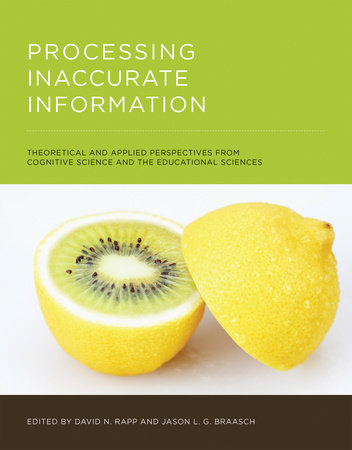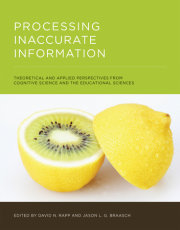Acknowledgments vii
Contributors ix
1 Accurate and Inaccurate Knowledge Acquisition 1
David N. Rapp and Jason L. G. Braasch
I Detecting and Dealing with Inaccuracies 11
2 Correcting Misinformation--A Challenge for Education and Cognitive Science 13
Ullrich K. H. Ecker, Briony Swire, and Stephan Lewandowsky
3 The Continued Influence Effect: The Persistence of Misinformation in Memory and Reasoning Following Correction 39
Colleen M. Seifert
4 Failures to Detect Textual Problems during Reading 73
Douglas J. Hacker
5 Research on Semantic Illusions Tells Us That There Are Multiple Sources of Misinformation 93
Brenda Hannon
6 Sensitivity to Inaccurate Argumentation in Health News Articles: Potential Contributions of Readers' Topic and Epistemic Beliefs 117
Jason L. G. Braasch, Ivar Braten, M. Anne Britt, Brent Steffens, and Helge I. Stromso
7 Conversational Agents Can Help Humans Identify Flaws in the Science Reported in Digital Media 139
II Mechanisms of Inaccurate Knowledge Acquisition 159
8 Knowledge Neglect: Failures to Notice Contradictions with Stored Knowledge
Elizabeth J. Marsh and Sharda Umanath 161
9 Mechanisms of Problematic Knowledge Acquisition 181
David N. Rapp, Matthew E. Jacovina, and Jessica J. Andrews
10 Discounting Information: When False Information Is Preserved and When It Is Not 203
Yaacov Schul and Ruth Mayo
11 The Ambivalent Effect of Focus on Updating Mental Representations 223
Herre van Oostendorp
12 Comprehension and Validation: Separable Stages of Information Processing? A Case for Episetemic Monitoring in Language Comprehension 245
III Epistemological Groundings 277
13 An Epistemological Perspective on Misinformation 279
Andrea A. diSessa
14 Percept-Concept Coupling and Human Error 297
Patricia A. Alexander and Peter Baggetta
15 Cognitive Processing of Conscious Ignorance 329
Jose Otero and Koto Ishiwa
IV Emerging Models and Frameworks 351
16 The Knowledge Revision Components (KReC) Framework: Processes and Mechanisms 353
Panayiota Kendeou and Edward J. O'Brien
17 The Content-Source Integration Model: A Taxonomic Description of How Readers Comprehend Conflicting Scientific Information 397
Marc Stadtler and Rainer Bromme
18 Inaccuracy and Reading in Multiple Text and Internet/Hypertext Environments 403
Peter Afflerbach, Byeong-Young Cho, and Jong-Yun Kim
19 Epistemic Cognition and Evaluating Information: Applying the AIR Model of Epistemic Cognition 425
Clark A. Chinn, Ronald W. Rinehart, and Luke A. Buckland
Index 455




